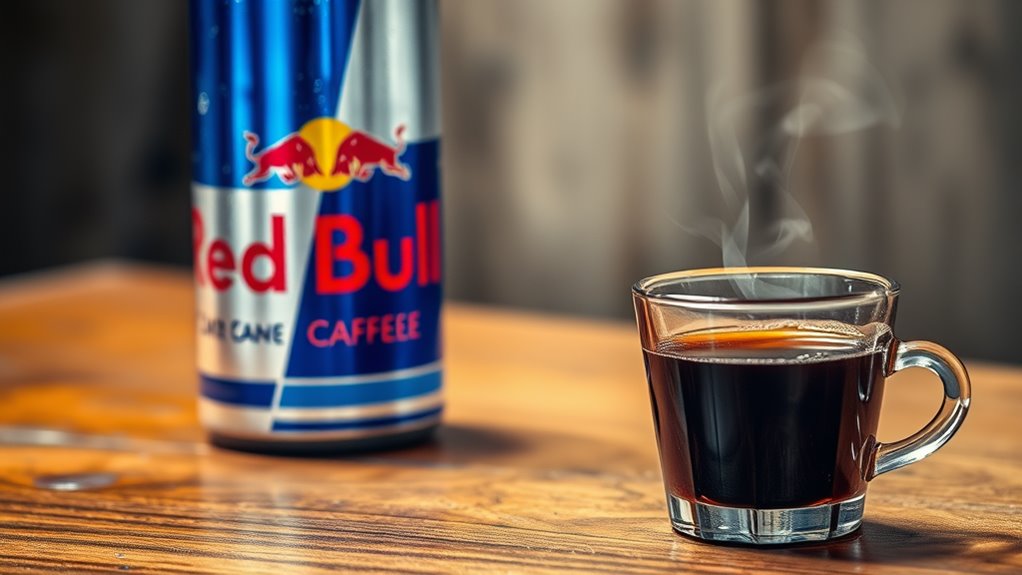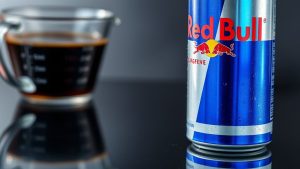
Red Bull contains 80 mg of caffeine in its 8.4 oz can, making it a moderate source compared to other beverages, like brewed coffee, which can have 95 to 200 mg. This caffeine can enhance alertness and focus, but it's important to consume it in moderation. Keep in mind that Red Bull also has high sugar content and other ingredients that may affect your health. Discover more about its effects and comparisons with other drinks.
When you crack open an 8.4 oz can of Red Bull, you're getting 80 mg of caffeine, which is less than a typical 8 oz cup of brewed coffee that can range from 95 to 200 mg. This caffeine content positions Red Bull as a moderate source of caffeine among popular beverages. If you're considering energy drinks, it's important to understand how Red Bull's caffeine compares to other options available on the market.
Red Bull is a leader in the energy drink sector, and part of its appeal lies in its blend of ingredients. Besides caffeine, it contains taurine, B vitamins, and high sugar content, which contribute to its energy-boosting properties. While the standard 8.4 oz can provides 80 mg of caffeine, larger sizes, such as the 20 oz can, contain proportionally more, allowing you to choose based on your caffeine needs.
The caffeine in Red Bull is known for its ability to enhance alertness and focus. Many people consume it to get a quick energy boost, especially during long work hours or intense study sessions. However, it's essential to be aware that excessive consumption can lead to negative side effects, including anxiety, insomnia, and an increased heart rate. Your sensitivity to caffeine also plays a considerable role; some individuals may feel jittery or anxious even with lower doses. Additionally, moderate consumption of caffeine can improve attention and reaction time, making it a useful tool for productivity.
Caffeine's effects typically peak within an hour after consumption and can last for about 5 to 6 hours. This makes timing your intake important if you're looking to maximize its benefits. However, balancing caffeine consumption with adequate water intake is crucial, as high caffeine levels may lead to dehydration.
Health considerations surrounding Red Bull shouldn't be overlooked. The drink's high sugar content can contribute to potential health issues like obesity and dental problems. Additionally, while taurine is included for its performance-enhancing potential, combining it with caffeine could exacerbate cardiovascular risks. Regular consumption can also lead to caffeine tolerance and dependence, making it essential to monitor your intake.
It's worth noting that Red Bull isn't recommended for children due to its high caffeine and sugar levels. Pregnant women should also be cautious, considering the potential health risks associated with caffeine consumption during pregnancy.
For athletes, Red Bull can provide a quick energy boost beneficial for enhancing endurance and mental performance during sports that require sustained activity. The brand's marketing strategies, including sponsorship of extreme sports, have made it synonymous with high-energy lifestyles and sports culture.
In comparison to other energy drinks, Red Bull's caffeine content is moderate. For instance, Monster Energy contains 160 mg of caffeine in a 16 oz serving, while 5-Hour Energy offers notably higher caffeine levels in a smaller serving. Brewed coffee generally contains more caffeine per serving than Red Bull, making it a viable alternative for those seeking a stronger caffeine kick.
Conclusion
To sum up, Red Bull contains about 80 mg of caffeine per 8.4 oz can, making it comparable to a cup of brewed coffee. This moderate level of caffeine can provide a quick energy boost, much like a shot of adrenaline before a big event. However, it's important to consume it mindfully, as too much caffeine can lead to jitters or insomnia. Always be aware of your total caffeine intake from all sources for a balanced approach to energy and health.



